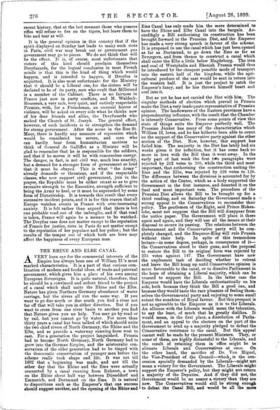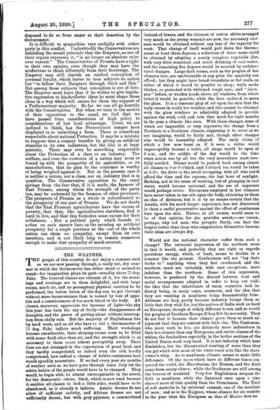THE RHINE AND ELBE CANAL.
AVERY keen eye for the commercial interests of the Empire has always been one of William IL's most marked characteristics. It is a part of that curious com- bination of modern and feudal ideas, of trade and paternal government, which gives him a place of his own among European Sovereigns. It is quite natural, therefore, that he should be a convinced and ardent friend to the project of a canal which shall unite the Rhine and the Elbe. Nature has given Northern Germany abundance of water carriage, but the rivers all run the same way. If you want to go due north or due south you find a river not far off that will take you in either direction. But if you want to cross from one river basin to another you find that Nature gives you no help. You may go by road or by rail, but you cannot go by water. For more than thirty years a canal has been talked of which should unite the two chief rivers of North Germany, the Rhine and the Elbe, and so provide a waterway running from west to east. For a generation the project languished. Prussia had to become North Germany, North Germany had to grow into the German Empire, and the aristocratic con- servatism of the older generation had to be tinged with the democratic conservatism of younger men before the scheme really took shape and life. It was not till 1892 that a beginning was made, and not till the other day that the Rhine and the Ems were actually connected by a canal running from Ruhrort, a town on the Rhine about half way between Diisseldorf and Emmerich, and Dortmund on the Ems. It is natural to dispositions such as the Emperor's that one success should suggest another, and the opening of the Rhine and Ems Canal has only made him the more determined to have the Rhine and Elbe Canal into the bargain. Ac- cordingly a Bill authorising its construction has been brought forward in the Prussian Diet, and the Emperor has made a very strong speech in favour of the scheme. It is proposed to use the canal which has just been opened as far as Dortmund, to go down the Ems as far as Bevergern, and from thence to construct a canal which shall enter the Elbe a little below Magdeburg. The iron and coal of Westphalia and Rhenish Prussia would thus be introduced by the cheapest possible mode of transport into the eastern half of the kingdom, while the agri- cultural produce of the east would be sent in return into the western half. It is just the project to catch the Emperor's fancy, and he has thrown himself heart and soul into it.
But as yet he has not carried the Diet with him. The singular methods of election which prevail in Prussia make the Diet a very inadequate representative of Prussian opinion. The landowners of the Eastern provinces have a preponderating influence, with the result that the Chamber is intensely Conservative. From some points of view this state of things suits the Emperor perfectly well. The Prussian JUnker has many of the characteristics which William II. loves, and he has hitherto been able to count on the support of the Conservative party against the other section of the Diet. Now, however, this support has failed him. The majority in the Diet has lately had six weeks given it for reflection, but it has come back no more in love with the Bill than it went away. In the early part of last week the first biro paragraphs were rejected by 212 votes to 209, while the third and most important, that authorising the construction uniting the Ems and the Elbe, was rejected by 228 votes to .126. The difference between the divisions is accounted for by the action of the Centre, which as a body supported the Government in the first instance, and deserted it on the final and 'most important vote. The procedure of the Prussian Diet allows the Bill to be brought up for a third reading, and on Saturday the Government made a strong appeal to the Conservatives to reconsider their policy. The gentlemen of the Right, said Prince Hohen- lohe, must not suppose that the Bill will disappear from the notice paper. The Government will place it there again and again, and they will use all the means at their disposal to secure its passing. The relations between the Government and the Conservative party will be com- pletely changed, and the Emperor-King will rule Prussia without their help. In spite of this tremendous lecture—in some degree, perhaps, in consequence of it— the Conservatives stood to their guns, and the proposal to restore the Bill to its original form was rejected by 235 votes against 147. The Government have now the unpleasant task of deciding whether to retreat and leave the Bill hung up until Conservative opinion is more favourable to the canal, or to dissolve Parliament in the hope of obtaining a Liberal majority, which can be trusted to support the Bill. In the latter case the Emperor would have the Liberals enthusiastically on his side, both because they think the Bill a good one, and because they would taste the rare pleasure of feeling them- selves the Governmental party and enjoying to some small extent the sunshine of Royal favour. But this prospect is not as agreeable to the Emperor as it is to the Liberals. An alliance with the Liberals would mean the toleration, to say the least, of much that he greatly dislikes. It would mean, in the first place, a dissolution of Parlia- ment, and an appeal to the electors on the part of the Government to send up a majority pledged to defeat the Cdnservative resistance to the canal. But this appeal cannot well be made by the present Ministers. They, or some' of them, are highly distasteful to the Liberals, and the result of retaining them in office might be to alienate Liberals and Conservatives at once. On the other hand, the sacrifice of Dr. Von Miguel, the Vice-President of the Council—which, is the con- cession specially demanded by the Liberals—might not mean a victory for the Government. The Liberals might support the Emperor's policy, but they might not return a, majority of the Deputies. And if they did not,-the Government would be no nearer a victory than they are now. The Conservatives would still be strong enough to defeat the Canal Bill, and would be all the more disposed to do so from anger at their desertion by the Government.
It is difficult to sympathise very cordially with either party in this conflict. Undoubtedly the Conservatives are defending the sound principle that the Emperor, as one of their organs expresses it, " is no longer an absolute ruler over vassals." The Conservatives of Prussia have a right to their own opinion, even though they may have the misfortune to think differently from their Sovereign. The Emperor may still cherish an exalted conception of personal loyalty, which leaves to true subjects no option but "to follow their Hargrave through thick and thin." But among those subjects that conception is out of date. The Emperor must learn that if he wishes to give legisla- tive expression to his davOurite ideas he must shape those ideas in a way which will secure for them the support of a Parliamentary majority. So far we •can all go heartily with the Conservatives. But when we turn to the motive of their opposition to the canal, we find that we have passed from considerations of high policy to considerations of low local advantage. Never, we are inclined to think, has the . Protectionist temper been displayed in so uninviting a form. There is something respectable about national Protection. It may be a mistake to suppose that a country benefits by giving an artificial stimulus to its own industries, but the idea is at least patriotic. There may even be something respectable about the Protection of a class or an industry. The welfare, and even the existence of a nation may seem so bound up with the prosperity of its agriculture, or its manufactures, that no gain to the consumer is worthy of being weighed against it. But in the present case it is neither a nation, nor a class, nor an industry that is in question. The Conservative opposition to the canal springs from the fear that, if it is made, the farmers' of East Prussia, among whom the strength of the party lies, may be undersold by the farmers of other provinces. , The prospects of Prussia as a whole is subordinated to the prosperity of one part of Prussia. We do not doubt that the East Prussian agriculturists have the excuse of poverty, that they, like agriculturists elsewhere, find it hard to live, and that this furnishes some excuse for their selfishness. . But a political party which founds its action on such narrow lines as the securing an artificial prosperity for a single province at the cost of the whole nation can claim no sympathy, except from its own members, and is not likely long to remain numerous enough to make that sympathy of much account.



































 Previous page
Previous page